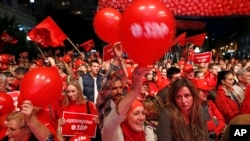Bosnia's 3.3 million voters will choose a new political elite across six layers of government on Sunday in an election that, had it happened a few months ago, might have been a catalyst for change.
But hopes that civil unrest in February would usher in a brighter future for a country riven by corruption and ethnic and ideological divisions have been all but extinguished in the aftermath of devastating floods that struck three months later.
Senahida Kovacevic says she has spent every day since mid-May in rubber boots, clearing her home of the mud that buried it during the worst rains to hit Bosnia in more than a century.
From the 800 million euros ($1 billion) in aid pledged by international donors to help the country recover, 47-year-old Kovacevic, her mother and the three brothers she lives with received a couple of doors and windows, which didn't fit.
"We cleaned it all alone; nobody helped us," said Kovacevic, whose village, Topcic Polje, was wiped off the map during the floods.
With the general election looming, the unemployed military veteran echoed an increasingly common accusation against Bosnia's much-maligned political class.
"They give the aid to their party supporters, even though their houses were not flooded," she said.
Complaints about the misuse of foreign flood aid are rife, sharpening the perception of a corrupt political elite that has left would-be voters disillusioned and despairing of change almost 20 years after the end of Bosnia's 1992-95 war.
Anger over corruption and unemployment was at the heart of an unprecedented spasm of popular unrest in February, when protests over factory closures turned violent and spread to several cities, including the capital Sarajevo, where the presidency was set on fire.
Shock gave way to hope that change might be afoot; Britain warned of a "wake-up call" for Europe to address a post-war system of ethnic power-sharing in Bosnia - between Orthodox Christian Serbs, Catholic Croats and Muslim Bosniaks - that has stifled development, halted progress towards European Union membership and fostered costly networks of political patronage.
Any change that followed, however, was largely cosmetic. Ad hoc popular assemblies known as plenums, which sprang up after the protests, petered out in disappointment. To many Bosnians, Sunday's election represents little more than a case of rearranging the deckchairs on a sinking ship.
"The sense of doom accompanying these elections is palpable; only another temporary rotation in the ruling oligarchy appears possible," said Balkans expert Jasmin Mujanovic.
'Borrowed time'
Voters will choose officials for 518 posts, including the country's three-person rotating presidency, and in the national parliament, two regional parliaments and 10 cantonal assemblies.
Devised by U.S. negotiators during peace talks in 1995, the system has left the country ruled by parties with seemingly irreconcilable visions of their country's future; Serb leaders want to secede, Croats say they should have their own entity within Bosnia, and Bosniaks want a strong, united state.
Policy is frequently fragmented, and corruption rife.
Transparency International said it had received numerous complaints of aid being distributed according to party lines and family ties. Last month, two U.S. diplomats, writing in a joint blog, accused political leaders in Bosnia of using donations "to fill their coffers to cover existing budget shortfalls."
The crisis of governance is wind in the sails of ethnic Serb nationalists like Milorad Dodik, running for re-election as president of Bosnia's Serb Republic on a promise to one day turn the entity into an independent state.
The arrival of Russian Cossacks in the Serb Republic's main town, Banja Luka, last week grabbed headlines in Sarajevo when it emerged their leader had commanded a unit active in Russia-annexed Crimea earlier this year. Bosnian Serb authorities said they were part of a commemoration of World War I.
"As long as Bosnia-Herzegovina is a country that is defined by ethno-territorialism and not actual democratic representation, this country is living on borrowed time," said Sarajevo-based Kurt Bassuener, senior associate at the Democratization Policy Council, a think-tank.
"The ability for these elections to deliver result that will improve things to a significant extent just is not there." Balkans expert Mujanovic warned of more unrest: "If the elections are unable to produce the kinds of changes people want...they will seek regime change in the streets.. The results may be even more ferocious than what we saw in the spring."
($1 = 0.7885 euro)





